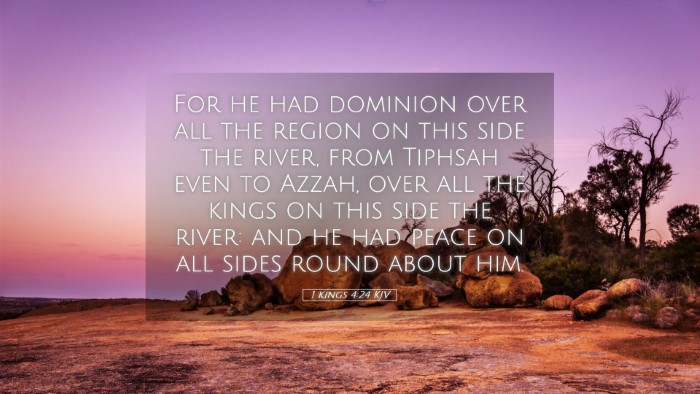Commentary on 1 Kings 4:24
Verse: "For he had dominion over all the region on this side the river, from Tiphsah even to Azzah, over all the kings on this side the river: and he had peace on all sides round about him."
Introduction
In 1 Kings 4:24, we find a significant statement concerning King Solomon’s reign. This verse highlights the vast territorial dominion and the peace that characterized his rule, reflecting the fulfillment of God’s promise to David and his descendants.
Territorial Dominance
The specificity in the geographical terms "from Tiphsah even to Azzah" underscores Solomon's extent of influence and control over the significant areas bordering Israel. Matthew Henry notes that this region represented both the northern and southern boundaries of Solomon's empire, indicating a degree of peace and stability not previously experienced in Israel.
Tiphsah is often identified with a location near the north of the Jordan River, while Azzah (Gaza) signifies the southern edge. The description serves to symbolize a united and expansive kingdom, which Solomon had established through wisdom in governance.
Implications of Sovereignty
Albert Barnes emphasizes the importance of this dominion as a reflection of God’s blessing upon Solomon. The use of the term “dominion” implies not just military strength but also the political and economic supremacy which Solomon wielded over neighboring nations.
- As a wise ruler, Solomon had alliances through trade and diplomacy.
- The references to other kings signify not merely submission but respect for Solomon’s authority.
Peace on All Sides
The mention of peace is integral to understanding Solomon’s reign. Adam Clarke expounds on the peace that surrounded Solomon, which was rare in the historical context of Israel. He points out that this peace stemmed from several factors, including:
- A strong centralized government that minimized internal strife.
- Military preparedness deterring external threats.
- Wise governance that fostered economic prosperity.
Spiritual Dimension of Peace
This peace also reflects an adherence to God’s covenant, suggesting that peace was a divine reward for faithfulness. The circumstances underscore the notion that absence of conflict does not merely result from armed strength alone; it often requires moral and spiritual dimensions. The absence of conflict allowed the nation to focus on building the Temple and pursuing other cultural advancements.
Conclusion
1 Kings 4:24 encapsulates the zenith of Solomon’s rule, reflecting a moment when the wisdom given by God facilitated both dominion and peace. For pastors, students, theologians, and scholars, this verse offers profound insights into the principles of leadership, governance, and divine favor. It invites reflection on how such blessings are realized in both historical and contemporary contexts.
Applications
As we consider Solomon’s reign, we must challenge ourselves through the following applications:
- How can modern leaders learn from Solomon's governance style?
- In what ways is peace maintained in our communities today?
- What lessons can be drawn about the relationship between divine favor and human leadership?


